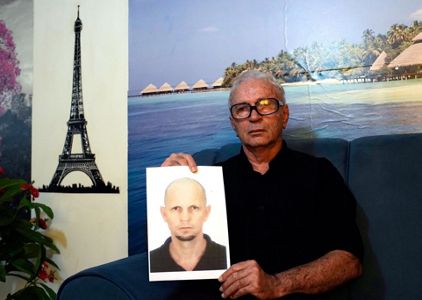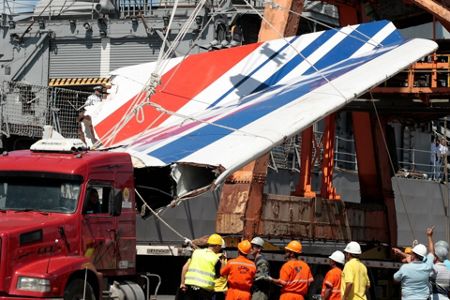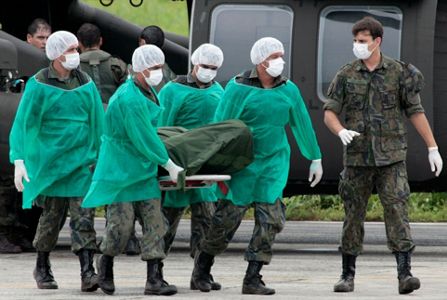PARIS (AP) — Families of the 228 people killed on a Rio-Paris flight that crashed in 2009 were hoping for justice at last. Instead, they're wracked with anger and disappointment as a long-awaited trial wraps up Thursday with little sign that anyone will be held accountable.
The verdict is expected on April 17 next year.
Airbus and Air France, two major players in the aviation industry, face manslaughter charges in the trial over the crash of storm-tossed Flight 447 over the Atlantic.
But even the state prosecutors felt the nine-week trial didn't produce enough proof of criminal wrongdoing by the companies, and they argued Wednesday that both should be acquitted. Prosecutors instead laid the blame primarily on the pilots, who died in the crash.
As prosecutors spoke, dozens of people who lost loved ones in the crash stormed out of the Paris courtroom.
“It was not worth waiting 13 years for a travesty of justice. ... This is a charge against the pilots and we can see that this prosecutor takes a lot of liberties with the truth. I’m ashamed,” said Danièle Lamy, president of an association of victims of Flight 447.
The A330-200 plane disappeared from radar in a storm over the Atlantic Ocean between Brazil and Senegal on June 1, 2009, with 216 passengers and 12 crew members aboard. It took two years to find the plane and its black box recorders on the ocean floor, at depths of more than 13,000 feet (around 4,000 meters).
As the defense had its final word Thursday, Airbus lawyers blamed the crash on pilot error, and Air France said the full reasons for the crash will never be known.
The verdict will be announced at a later date. If convicted, each company faces potential fines of up to 225,000 euros ($219,000) — a fraction of their annual revenues. No one risks prison, as only the companies are on trial.
The trial was fraught with emotion from the outset. Distraught families fought for more than a decade to push for a trial, and shouted down the CEOs of Airbus and Air France as the proceedings opened in October, crying out “Shame!” as the executives took the stand.
The official investigation found that multiple factors contributed to the crash, including pilot error and the icing over of external sensors called pitot tubes.
An Associated Press investigation at the time found that Airbus had known since at least 2002 about problems with the type of pitot tubes used on the jet that crashed, but failed to replace them until after the crash.
The crash had lasting impacts on the industry, leading to changes in regulations for airspeed sensors and in how pilots are trained.
During the trial, the court heard testimony from aeronautical experts and pilots — and recordings of the Flight 447 crew's last conversation in the cockpit during the plane's excruciating final four minutes. The pilots didn't seem to understand why the information from the sensors was wrong, and tried to save the plane as best they could.
Air France was accused of not having implemented training in the event of icing of the pitot probes despite the risks. It later changed its training manuals and simulations.
Airbus was accused of having known that the model of pitot tubes on Flight 447 was faulty, and not doing enough to urgently inform airlines and their crews about it and to ensure training to mitigate the risk.
Prosecutors said the trial didn't produce “a unanimous truth” about what happened.
“We do not know what motivated these piloting choices and it is necessary to note the importance of human factors in the accident," the prosecution's final statement said.
Airbus lawyer Simon N’Diaye appealed to the judges to render a not-guilty verdict “that will be difficult on a human level, but technically and juridically justified.”
Another Airbus lawyer, Antoine Beauquier, acknowledged that the iced-over pitots had “a link” to what happened, “but it wasn't the direct cause of the accident.”
Air France lawyers said the world may never find out exactly went wrong.
“I’m sorry to say this but, no, grief does not confer any right to justice. Mourning does not authorize a special law to be enacted in court," said Air France lawyer François Saint-Pierre. “Do we really know what happened? No, we don’t know.”
Air France has already compensated families of those killed. The victims came from 33 countries, and families from around the world are among the plaintiffs.
“We expected an impartial trial,” Lamy said. “The prosecutors have deliberately chosen ... to purely and simply defend the multinational Airbus and Air France.”
Copyright 2022 The Associated Press. All rights reserved. This material may not be published, broadcast, rewritten or redistributed without permission.






